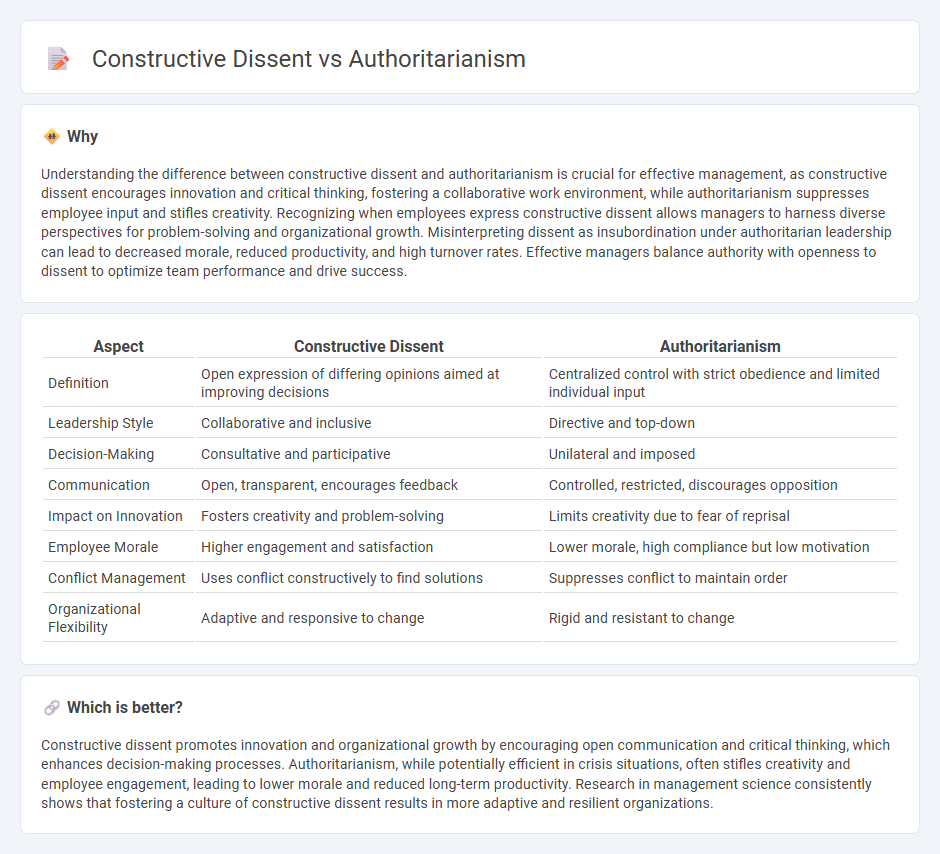
Constructive dissent in management fosters open dialogue and critical thinking, driving innovation and informed decision-making within organizations. Authoritarianism, by contrast, centralizes power and suppresses employee input, often stifling creativity and reducing morale. Explore more about how balancing these approaches can enhance leadership effectiveness and organizational success.
Why it is important
Understanding the difference between constructive dissent and authoritarianism is crucial for effective management, as constructive dissent encourages innovation and critical thinking, fostering a collaborative work environment, while authoritarianism suppresses employee input and stifles creativity. Recognizing when employees express constructive dissent allows managers to harness diverse perspectives for problem-solving and organizational growth. Misinterpreting dissent as insubordination under authoritarian leadership can lead to decreased morale, reduced productivity, and high turnover rates. Effective managers balance authority with openness to dissent to optimize team performance and drive success.
Comparison Table
| Aspect | Constructive Dissent | Authoritarianism |
|---|---|---|
| Definition | Open expression of differing opinions aimed at improving decisions | Centralized control with strict obedience and limited individual input |
| Leadership Style | Collaborative and inclusive | Directive and top-down |
| Decision-Making | Consultative and participative | Unilateral and imposed |
| Communication | Open, transparent, encourages feedback | Controlled, restricted, discourages opposition |
| Impact on Innovation | Fosters creativity and problem-solving | Limits creativity due to fear of reprisal |
| Employee Morale | Higher engagement and satisfaction | Lower morale, high compliance but low motivation |
| Conflict Management | Uses conflict constructively to find solutions | Suppresses conflict to maintain order |
| Organizational Flexibility | Adaptive and responsive to change | Rigid and resistant to change |
Which is better?
Constructive dissent promotes innovation and organizational growth by encouraging open communication and critical thinking, which enhances decision-making processes. Authoritarianism, while potentially efficient in crisis situations, often stifles creativity and employee engagement, leading to lower morale and reduced long-term productivity. Research in management science consistently shows that fostering a culture of constructive dissent results in more adaptive and resilient organizations.
Connection
Constructive dissent promotes open communication and critical thinking within management, leading to improved decision-making and innovation by challenging authoritarian practices that prioritize obedience and control. Authoritarian management styles suppress constructive dissent, limiting employee engagement and creativity, which can result in poor problem-solving and low morale. Understanding the balance between encouraging dissent and maintaining authority is crucial for effective leadership and organizational performance.
Key Terms
Decision-making
Authoritarianism in decision-making often centralizes power, limiting input from diverse perspectives and leading to unilateral choices that may overlook critical insights. Constructive dissent encourages open dialogue and critical feedback, fostering informed decisions that incorporate multiple viewpoints and enhance problem-solving effectiveness. Explore how balancing these approaches can improve leadership and organizational outcomes.
Power dynamics
Authoritarianism centralizes power, suppressing dissent to maintain strict control and limit individual freedoms, often resulting in rigid hierarchies and reduced innovation. Constructive dissent, by contrast, redistributes power through open dialogue and critical feedback, fostering collaboration and organizational growth. Explore how shifting power dynamics influence decision-making and governance in diverse environments.
Organizational culture
Authoritarianism in organizational culture is characterized by centralized decision-making, strict hierarchy, and limited employee autonomy, often stifling creativity and open communication. Constructive dissent, conversely, encourages open dialogue, critical feedback, and collaborative problem-solving, fostering innovation and adaptability within organizations. Explore how embracing constructive dissent can transform organizational culture and enhance overall performance.
Source and External Links
Authoritarianism - Authoritarianism is a political system marked by concentrated and centralized government power, suppression of political opposition, and limited civil liberties, often maintained through repression and control of the armed forces.
Authoritarianism, explained - Authoritarianism shifts power from the people to a ruler or ruling group by suppressing political freedoms and civil rights, often through gradual erosion of democratic institutions rather than sudden coups[
 dowidth.com
dowidth.com